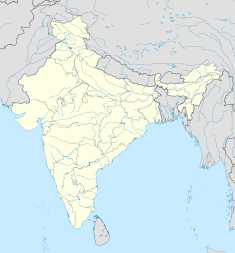| Mahmud Gawan Madrasa | |
|---|---|
 Complete view of Mahumad Gawan Madrasa | |
| Type | Ancient University, Now a Mosque |
| Location | Bidar (Karnataka) |
| Coordinates | 17°54′53″N 77°31′48″E / 17.91476°N 77.53010°E |
| Area | 205 ft × 180 ft (62 m × 55 m) |
| Elevation | 2,330 feet (710 m) |
| Height | 131 feet (40 m) |
| Formed | during Bahamani Dynasty |
| Founded | 1460 (1460) |
| Founder | Mahmud Gawan (Khwaja Mahmud Geelani) |
| Built | 1472[1] |
| Original use | Educational |
| Current use | Religious (Sunni Islam) |
| Architectural style(s) | Indo-Islamic |
| Governing body | Govt. of India |
| Owner | Archaeological Survey of India since 1914 |
The Madrasa of Mahmud Gawan is a madrasa or Islamic college in Bidar, Karnataka, India. It was built in the 1460s and is an example of the regional style of Indo-Islamic architecture under the Bahmani Sultanate. This heritage structure is placed under the list of monuments of national importance. Founded by the prime-minister of the sultanate in the late 15th century, it bears testimony to the scholarly genius of Mahmud Gawan, who first came to Delhi as a Persian trader (in exile)[2] from Gilan in Iran and moved to Bidar in 1453.[3]
Mahmud reportedly built the madrasa with his own money and it functioned like a residential University which was built and maintained on the lines of Madrasa of Khurasan. The imposing and spacious building of the institution is considered as an architectural gem and an important landmark of Bidar.
The building is one of those put by UNESCO on its "tentative list" to become a World Heritage Site in 2014, under the name Monuments and Forts of the Deccan Sultanate (despite there being a number of different sultanates).[4]
- ^ Sen, Sailendra (2013). A Textbook of Medieval Indian History. Primus Books. pp. 106–108. ISBN 978-9-38060-734-4.
- ^ "Mohamad Gawan Madarsa". HolidayIQ.com. Retrieved 12 March 2015.
- ^ "Deccan dreams". Business Line. 23 September 2005. Retrieved 16 March 2015.
- ^ UNESCO "tentative list"
© MMXXIII Rich X Search. We shall prevail. All rights reserved. Rich X Search

